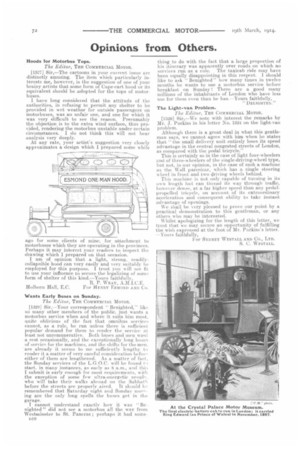Opinions from Others.
Page 22

If you've noticed an error in this article please click here to report it so we can fix it.
Hoods for Motorbus Tops.
The Editor, THE COMMERCIAL MOTOR. [1327] Sir,—The cartoons in your 'current issue are distinctly amusing. The itern which particularly interests me, however, is the. suggestion of one of your brainy artists that some form of Cape-cart hood or its equivalent should be adopted for the tops of motorbuses.
I have long considered that the attitude of the authorities, in refusing to permit any shelter to be provided in wet weather for outside passengers On motorbuses, was an unfair one, arid one for which it was very difficult to see the reason. Presumably the objection is to the extra wind surface, thus provided, rendering the motorbus unstable under certain circumstances. I do not think this will not bear analysis very deeply.
At any rate, your artist's suggestion very closely approximates a design which I prepared some while
ago for some clients of mine-, for attachment to motorbuses which they are operating in the provinces. Perhaps it may interest your readers to inspect the drawing which I prepared on that occasion.
I am of opinion that a light, strong, readily. collapsible hood can very easily and very suitably be employed for this purpose.. I trust you will see tit to use your influence to secure the legalizing of some form. of shelter of this kind.—Yours faithfully,
R. P. WRAY, A.M.I.C.E.
Holborn Hall, E.C. For .FTENTIV ESMOND AND Co.
Wants Early Buses on Sunday.
The Editor, THE COMMERCIAL MOTOR.
L 32S] Sir,—Your correspondent "Benighted," like so many other members of the public, just wants a motorbus service when and where it suits him most, quite oblivious of the fact that omnibus serviceA cannot, as a rule, be run unless there is sufficient. popular demand for them to render the service at least not unremunerative. Both buses and men want -a rest occasionally, and the exceptionally long hours of service for the ma,ehines, and the .shifts for the men, are already it seems to me sufficiently lengthy te render it a matter of very careful consideration before either of them are lengthened. As a matter of fact. the Sunday services of the L.G.O.C. will be found te start, in many instances, as early as 8 a.m., and this I.submit is early enough for most requirements, with the exception of some few ultra-energetic people, who will take their walks abroad on the Sabbath before the streets are properly aired. It should 117, remembered that Saturday night and Sunday more, ing are the only long spells the buses get in the. garage.
I cannot understand exactly how it was "Benighted" did not sec a motorbus all the way from Westminster to St. Pancras ; perhaps it had someDi 0 thing to do with the fact that a large proportion of his itinerary was apparently over roads on which no services run as arule. The taxicab ride may have been equally disappointing in this respect. I should like to ask "Benighted" how many times in twelve months he wants to use a motorbus service before breakfast on Sunday ? There are a good many millions of the inhabitants of London who have less use for them even than he has.—Yours faithfully,
"DELIGHTED."
The Light-van Problem.
The Editor, TEE COMMERCIAL MOTOR.
[1329] Sir,—We note with interest the remarks by Mr. J. Pnrkiss in his letter No. 1324 on the light-van problem. Although there is a great deal in what this gentleman says, we cannot agree with him when be eta-tea that "the small delivery unit entirely loses its speed advantage in the central congested streets of London, as compared with the pedal tricycle." This is certainly so in the ca-se of light four-wheelers and of three-wheelers of the single driving-wheel type, but not, in our opinion, in the case of such a, machine as the Wall parcelcar, which has a single steering wheel in front and two driving wheels behind.
This machine is not only capable of turning in its own length but can thread its way through traffic, liowever dense, at a far higher speed than any pedalpropelled tricycle, on account of its extraordina,ry acceleration and consequent ability to take instant advantage of openings.
We shall be very pleased to prove our point by a practical demonstration to this gentleman, or any others who may be interested.
Whilst apologizing for the length of this letter, we trust that we may secure an opportunity of fulfilling the wish_ expressed at the foot of Mr. Purkiss's letter. —Yours faithfully, For SYDNEY WESTALL AND Co., LTD. S. C. WEST ALL.


























